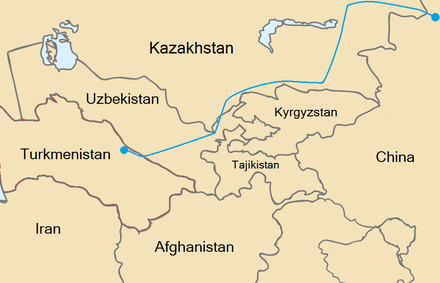China and Kazakhstan—two countries with a vision. One brings global ambition, the other a strategic geography. But what does this ‘strategic partnership’ really mean?
For over 30 years, China and Kazakhstan have built an economic and strategic relationship, transforming Kazakhstan from a quiet Central Asian nation to a key player in China’s Belt and Road Initiative (BRI). What started as simple trade has evolved into a web of infrastructure projects, energy deals, and cultural exchanges that increasingly bind the two nations. Today, this relationship isn’t just about numbers or economic growth; it’s about influence, control, and trust. In this analysis, we’ll explore the many sides of this partnership: its promises, its power dynamics, and what’s at stake.
Trade and Investment: A Booming Partnership or a Power Imbalance?
Trade between Kazakhstan and China has boomed, reaching $41 billion in 2023, and Chinese investments have flooded Kazakhstan’s economy in industries ranging from mining to technology. In just the last few years, Kazakhstan and China have signed agreements worth billions to develop factories, mines, and industrial zones across Kazakhstan. These agreements are a testament to China’s interest in Kazakhstan’s resources and Kazakhstan’s need for a strong economic partner to boost growth.
However, there’s a potential imbalance lurking beneath the surface. China is now Kazakhstan’s largest trading partner, which has been a boom for Kazakhstan’s economy, but it also raises concerns. Trade largely favors China, with many of these investments controlled by Chinese companies. This deepening reliance on China could make Kazakhstan vulnerable to shifts in China’s economic interests. Some wonder if Kazakhstan is gaining prosperity or becoming economically dependent. Is this partnership truly balanced, or could it tilt in China’s favor as time goes on?
Energy Deals: Backbone of Kazakhstan’s Economy?
Energy cooperation is at the core of Kazakhstan-China relations, especially with large-scale projects like the China-Kazakhstan oil and gas pipelines. These pipelines are vital for China’s energy security, but they also create an economic backbone for Kazakhstan. With these projects, Kazakhstan’s oil and gas industries have grown significantly, and the steady income flow benefits the national economy. For example, the China-Central Asia natural gas pipeline, which pumps gas into China, has become a major income source for Kazakhstan.
Yet, there is a catch. As Kazakhstan increasingly depends on energy exports to China, it may find it hard to diversify its economy or to gain leverage in setting prices and terms for energy exports. In this setup, is energy a mutual benefit—or is Kazakhstan becoming too reliant on China’s need for fuel?

Image Source: “Route of the Central Asia–China gas pipeline” from Wikipedia
Infrastructure Projects: A New Silk Road or a Pathway to Dependence?
China’s Belt and Road Initiative (BRI) has positioned Kazakhstan as a key transit hub connecting China with Europe and the Middle East. Infrastructure projects, including new railways, highways, and cargo terminals, have opened up new routes through Kazakhstan, making it a “New Silk Road.” One notable project, the Trans-Caspian International Transport Route (TITR), connects China to Europe through Central Asia and bypasses traditional routes, offering faster trade options. These developments bring new economic opportunities and cement Kazakhstan’s position as a critical link in the BRI. However, the increasing role of Chinese companies in building and operating this infrastructure raises questions about how much control Kazakhstan retains over its trade routes. While the projects boost regional connectivity, they also tie Kazakhstan more closely to China’s strategic interests.
Soft Power and Public Perception: A Trust Issue?
China’s presence in Kazakhstan isn’t just economic; it’s also cultural. China has invested in Kazakh language programs, student exchanges, and cultural initiatives aimed at softening its image and building friendly ties. These programs show China’s commitment to fostering a close bond with Kazakhstan beyond just economic ties. China has been active in sponsoring scholarships, setting up educational institutions, and encouraging tourism between the two nations.
However, many Kazakh citizens remain wary of China’s influence, seeing it as potentially overbearing. Protests in 2016 and 2019 over potential land sales to Chinese investors showed just how deep these concerns run. While China has been working to improve its image, overcoming public mistrust remains a challenge. Can cultural diplomacy truly ease these fears, or do they highlight Kazakhstan’s cautious approach to its influential neighbor?
Green Investments: True Change or Greenwashing?
As the world pushes for greener practices, China has been investing in renewable energy projects in Kazakhstan, including wind farms, solar plants, and electric vehicle initiatives. At recent trade forums, both countries highlighted their green agenda, with China committed to supporting Kazakhstan’s transition to sustainable energy; these projects align with Kazakhstan’s own environmental goals and could support a cleaner economy in the future.
However, some see these green investments as an attempt by China to improve its image rather than a purely selfless commitment to the environment. With green projects, China may be looking to project a progressive, responsible image, both at home and internationally. By leading these projects, China can promote itself as a responsible, forward-thinking power, potentially strengthening its influence in Kazakhstan and beyond under the guise of sustainability.
Conclusion: Is a Partnership Worth the Price?
Kazakhstan’s partnership with China has undoubtedly brought opportunities. With increased trade, new infrastructure, and massive investments, Kazakhstan’s economy has grown, and its global role has expanded. However, the deeper this partnership goes, the more Kazakhstan must weigh the benefits against potential risks. China offers Kazakhstan a path to rapid development, but there’s a cost. Kazakhstan may face increasing dependency on Chinese capital, technology, and access to global markets through Chinese routes.
For Kazakhstan, the future depends on how carefully it can balance this relationship. Will it become an equal partner with China, benefiting from shared growth, or will it find itself relying too heavily on a powerful neighbor? The outcome of this relationship will shape the region’s future—and could redefine what it means to be a strategic partner in Central Asia.







